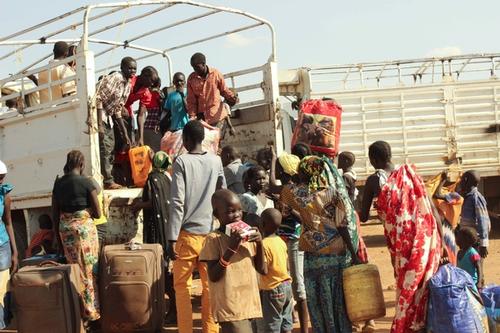When Zahari Nur’s grandmother brought her to the outpatient post in Digdiga, in rural Afar, Ethiopia, where Médecins Sans Frontières (MSF) teams were providing treatment for malnutrition, the little girl’s survival was uncertain. “I had given up hope on my grandchild. I thought she was going to die like the three others before her,” says Eisa Wasaitu, Zahari’s grandmother.
The one-year-old was diagnosed as suffering from severe acute malnutrition as well as marasmus, a deficiency of critical nutrients). Her mother is also ailing and suffers from psychosis and is in no condition to take care of Zahari and her older brother, leaving the grandmother as their sole guardian. After two months in the MSF program and admission into the stabilisation centre where, apart from being treated for malnutrition, she was given specialised treatment for pneumonia, Zahari slowly blossomed back to life. Her weight increased from 3.2 kilograms to 4.9 kilograms.
“When I see this child I feel very happy because the grandmother and the rest of the community thought she was going to die, but we saved her life,” says Nabiyu Ayalew, MSF’s outreach nurse.
MSF nutrition project covers vast, remote area
MSF staff travelled the inimitable lands of Afar in April of 2013 to respond to the nutritional emergency. Their outreach activities included working in Digdiga, where Zahari was treated, one of the 12 kebeles (a provincial administrative area) that MSF is covering in the nutritional intervention. Afar state is vast and the area MSF covers is one of the most remote and most neglected. The MSF base is located in Teru. Teru is subject to huge aggressive sand storms in the dry season with extreme temperature and violent rainstorms that flood seasonal rivers and make non-existent, partly gravel roads impassable in the rainy season.
MSF’s intervention covered 12 kebeles, all of which were very far from each other and whose inhabitants are completely cut off from healthcare. The decision to intervene was reached after an assessment found an alarming severe acute malnutrition rate in the region to be 26.6 per cent in an estimated population of close to 87,400 people. “Most of the cases that we admit in the stabilisation centre are severe acute malnutrition with complications – most of these are combined with either pneumonia or tuberculosis,” says Frank Katambula, MSF’s medical team leader in Afar.
MSF has been providing therapeutic feeding alongside treatment for various diseases like pneumonia and tuberculosis. Some cases, like that of Salama Hassan, whose nine-month-old baby has been admitted three times in the MSF stabilisation centre, have been particularly challenging. Salama does not believe that her child suffers from malnutrition but that a bad wind must have blown when they were released from the stabilisation centre and this wind made her child sick. Nevertheless, most cases have now stabilised and children under the age of five continue to receive therapeutic food.
Nomadic people still need access to basic healthcare
A total of 1,154 moderately acute malnourished patients, including 416 pregnant and lactating women, were treated during the program, either through outreach or as inpatients. The total number of patients includes 726 malnourished children who were admitted to the therapeutic feeding program, including 134 children, in severe condition, in the stabilisation centre.
“In total we have 78.2 per cent cured cases and a defaulter rate of 4.5 per cent, which to me is quiet good considering that access [staff accessing patients and patients accessing healthcare and MSF facilities] in this area is not at all easy,” says Jean François Saint-Sauveur, MSF’s medical coordinator in Ethiopia.
The Afari are a pastoral nomadic people that move from place to place in search of water and pasture for their animals. This aspect of their life largely contributes to the defaulting of their treatment. This, combined with geographical access difficulties, complicates MSF’s ability to follow up on defaulters. The presence of MSF in the area is significant, not only because staff are providing lifesaving care but also because of their efforts in highlighting the healthcare problems of the rural Afari people and advocating for their access to basic medical services.




